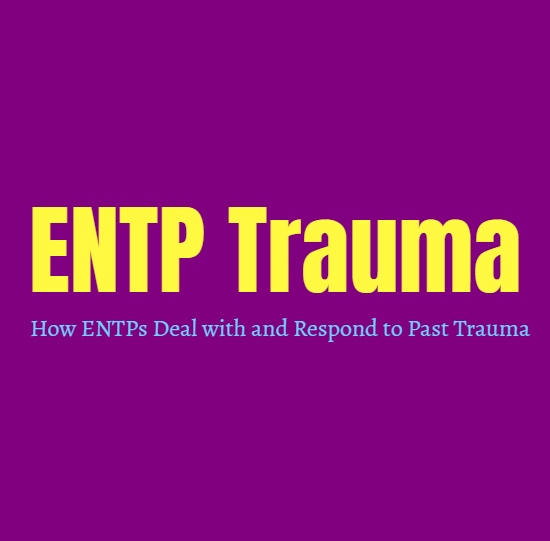ENTP Trauma: How ENTPs Deal with and Respond to Past Trauma
When it comes to experiencing trauma, everyone has their own ways of handling and coping with what they go through. Of course, it often requires certain help from others, and serious trauma can also require therapy to find tools and ways to move through it. There are so many different types of trauma. Some happen so subtly that we don’t even realize we have endured a truly traumatic experience. It can be difficult to process, especially when you are still involved in the trauma which is bringing you down. This is something that can affect someone’s behavior long-term and make certain personality types behave in ways that don’t seem to really fit who they normally are. This is why it is important to understand the different ways that trauma can change someone or alter their behavior.
When it comes to dealing with trauma, ENTPs can have a tendency to avoid negative emotions. Diving into their feelings is not necessarily a natural response for them, especially when they are younger. As they age, the ENTP often starts to mature and learn how to better care for their own emotions, but this can take time and effort. ENTPs favor growth and improvement, which means learning how to reflect on their past and their own feelings about things. It isn’t an easy process, and it can be even more difficult for the ENTP who has endured childhood trauma. For anyone, this can be something that stunts growth and makes it harder to understand why, but ENTPs can overcome this trauma and discover the tools they need to heal and move on from what has happened to them.
ENTP Childhood Trauma
Dealing with trauma from a young age can certainly change the way the ENTP views the world. They likely develop a sense of independence because of it, not knowing how to rely on others or trust them with anything. For the ENTP, learning and understanding the world is an important part of who they are, but having endured serious trauma can taint that view. They see things in a much darker way, not really knowing how to trust people. The ENTP child who has been through something traumatic can go through times of distancing themselves from others, even rebelling against what they are told to do. This can cause them to be seen as troublemakers when they are younger, and their loved ones might misunderstand what is happening to them. They might not seek out validation constantly, but the ENTP child who has gone through trauma or abuse likely seeks someone who can show a sense of understanding for what they have been through. If that parent or loved one is not patient and understanding, then it can really cause them to distance themselves from people and struggle to be vulnerable again in the future.
How Trauma Changes The ENTP
Enduring trauma can cause the ENTP to withdraw a bit more, especially as children. They might need time to process certain experiences, making it hard for them to trust others. While they are often still social people, they find it hard to ever truly let anyone in. They keep most people at a distance, not feeling they can easily trust them with their secrets or with sharing their emotions. This can make relationships a challenge for the ENTP, especially if they are enduring trauma that was connected to someone hurting them. They struggle to see a valid reason to really trust most people and might have a deeply cynical view of humanity in general. They have a hard time letting go of people’s mistakes and will continue to seek out validation in ways that make them seem a bit chaotic. The ENTP, who has endured trauma that they have not dealt with, can show signs of being stuck in the past and not really knowing how to let go of things the way they normally would.
ENTP Coping with Trauma
ENTPs can sometimes exhibit certain unhealthy coping mechanisms, especially the less mature ENTPs. When they are younger, they tend to want to avoid negative emotions, so they seek out anything which keeps them distracted. Humor is often a tool for the ENTP, but this can be both a good and bad thing. It does cause them to deflect from what they are feeling, but sometimes they use humor to express those feelings outwardly without feeling quite as vulnerable. Focusing on their own feelings is a challenge when they are younger, so they might want to find ways to avoid this. Whether this means exploring some sort of new hobby or activity or finding ways to never be completely alone. They might reach out to new social groups and always want to keep themselves and their minds busy.
While the ENTP might search out their own ways of coping, neglecting their trauma or past experiences is not going to make the situation any better. Instead, it causes those feelings to fester, and they are likely to come out in unhealthy ways. ENTPs have a tendency to want to appear like they are completely fine and as if nothing bothers them. They might even express that they do not care about most things, always independent and prepared to escape if need be. The most important thing for the ENTP who wants to heal from their trauma is accepting that it has occurred. Recognizing that they have been through something traumatic is the first step, and then the ENTP can figure out the best ways to move on. Seeking professional help is almost always a necessary step when someone has been through a truly traumatic experience. The ENTP needs to find the right ways to heal and really allow those tools to help them succeed in their journey.
This Post is Brought To You By BetterHelp
